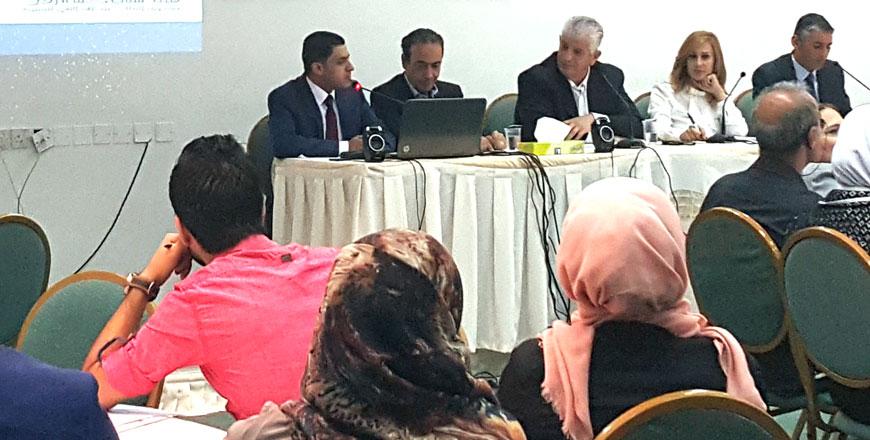You are here
‘Awareness vital to encourage youth engagement in drive for change’
By Laila Azzeh - Jul 18,2016 - Last updated at Jul 18,2016

Speakers participate in a seminar on youth participation in parliamentary elections, held in Amman, on Saturday (Photo by Laila Azzeh)
AMMAN — Unless young Jordanians are politically savvy and aware of the significant role of MPs, the coming parliament is unlikely to bring the desired change, experts and youth representatives agreed on Saturday.
Participants in a seminar organised by the Imdad Media Centre in cooperation with the German political foundation Konard-Adenauer-Stiftung highlighted the social constraints that stand in the way of producing quality lawmakers.
In a country where youths under 25 make up around 70 per cent of the population, panellists called for educating young Jordanians on their responsibilities towards their country.
“The new law allows those who are 18 to vote. How can we make sure that youths seize such an opportunity to elect competent parliamentarians?” asked former labour minister Atef Odeibat.
He noted, however, that “change is unlikely as long as Jordanians continue to give their votes based on tribal and regional considerations”.
“If youths are liberated from such limitations, then they will be able to contribute to a better future for the country. That is exactly what we need to inculcate among them,” Odeibat said.
On the other hand, participants criticised decision makers for “only remembering the importance of empowering youth politically a few months before the elections”.
“As a university student, I cannot belong to a political party without being interrogated [by security authorities] about it. You cannot ask us to vote for candidates based on their platforms when we lack basic political awareness,” said a youth representative.
The law guarantees freedom to join political parties without any consequences.
Participants also discussed “political money”, or “vote buying” and how Jordanians are lured to vote for candidates who portray themselves as “service deputies”, referring to lawmakers who dedicate most of their time trying to ensure their constituencies receive government services like jobs, roads and projects.
“University students still believe that not voting for a candidate that belongs to the same tribe is disloyalty and considered a shameless act,” said a university professor.
Odeibat underlined the need for youths to understand that candidates for parliamentary seats should be prepared with platforms that offer answers to challenges facing them, especially poverty and unemployment.
“The coming elections carry a historic moment to elect the most capable,” he noted.
A participant, Imad Nuseif, noted that the current electoral discourse is considered by the youth as “outdated” and “difficult to absorb”.
“With the impact of social media websites and their influence on the new generation, there is a need for a different approach to reach out to young people,” he said.
The seminar was held with the participation of the Crown Prince Hussein Foundation, the Jordan Institute of Diplomacy and Al Sindyan and Naseej youth initiatives.
Related Articles
AMMAN — A group of 130 young people from various governorates has launched “Naseej” (fabric) initiative to enhance youths’ participation in
AMMAN — Despite electoral reforms, some candidates in the northern governorates say they are still struggling to form or join lists for the
AMMAN — A group of Jordanians, in cooperation with a youth programming company, have launched an app to connect electoral candidates with vo

















